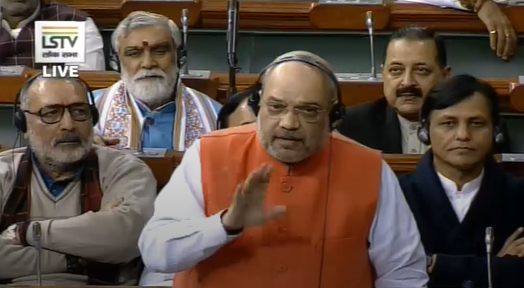Unhindered of Opposition rant against the NRC, Amit Shah tables Citizenship Bill amendment
New Delhi, December 9: Starting the week aiming to tick mark things on the agenda, Union Minister Amit Shah today tabled the Citizenship Amendment Bill in Lok Sabha. The Citizenship (Amendment) bill seeks to grant Indian citizenship to non-Muslim refugees from Pakistan, Bangladesh and Afghanistan escaping religious persecution there. Voicing it in the lower house, Amit Shah rightfully rejected the contention of the opposition that the Citizenship Bill was regressive and stated that the legislation was “not even 0.001% against the minorities of the country”.

As Congress MP Adhir Ranjan Chowdhury called the bill “nothing but a targeted legislation over minority people of our country”, Shah said he was ready to respond to all queries “but the Opposition must not walk out”. Adhir Ranjan Chudhary continued saying “It is an attack on the basic preamble of our Constitution. CAB can't be discussed in isolation, we need to discuss it in totality and this is against the basic fundamental right given to the citizens by the Constitution.”
Hitting back, Amit Shah asserted that nowhere in the Citizenship Amendment Bill has he mentioned Muslims. He asked the opposition to not tamper the facts. He further stated that the bill is not against any religion or any minority.
The bill has triggered protests in northeastern states with a large section of people, organisations and opposition parties opposing the bill. Indigenous people of the North-eastern states fear that the entry of these people will endanger their identity and livelihood. The AASU and various other organisations have launched a series of agitations against the Bill. They are arguing that it will nullify the provisions of the Assam Accord of 1985, which fixed March 24, 1971, as the cut-off date for deportation of all illegal immigrants irrespective of religion.
The Citizenship Act, 1955 regulates who may acquire Indian citizenship and on what grounds, according to PRS Legislative Research. A person may become an Indian citizen if they are born in India or have Indian parentage or have resided in the country over a period of time, etc. However, illegal migrants are prohibited from acquiring Indian citizenship. An illegal migrant is a foreigner who: (i) enters the country without valid travel documents, like a passport and visa, or (ii) enters with valid documents, but stays beyond the permitted time period.




